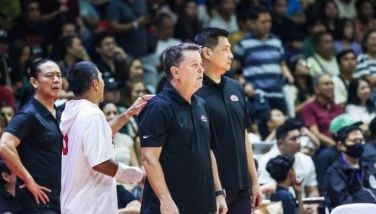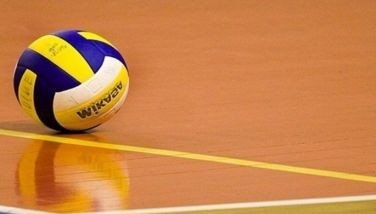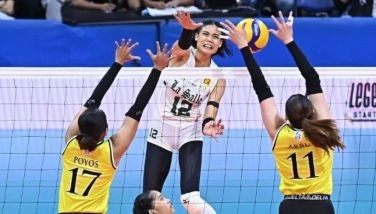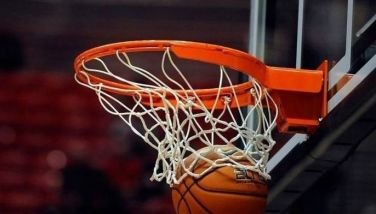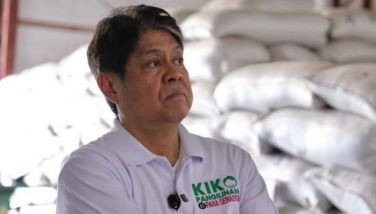Will Jayvee return his salary? - SPORTING CHANCE by Joaquin M. Henson
April 4, 2001 | 12:00am
If former Tanduay player Jayvee Gayoso makes good his threat of exposing the Gold Rhum Masters’ alleged illegal backroom operations by revealing the sordid details of his own under-the-table deal, he could be in line for a windfall.
Under the Philippine Basketball Association (PBA) reward-and-punishment system, a player who squeals on a salary cap violator and proves it is eligible to receive 25 percent of the team’s TV receipts for the season in question.
In Gayoso’s case, he could pocket as much as P3 million for spilling the beans.
But wait a minute. If Gayoso says he was the beneficiary of an illegal deal and now wants to bite the hand that fed him, shouldn’t he share in the guilt? Does his exposé exonerate him? Shouldn’t he give back to Tanduay or the PBA whatever illegal payments he received?
A PBA official said the bounty is open to teams, too, not only players. So if a team has the goods on another team and squeals, it’s entitled to a reward — just like Gayoso.
Theoretically, a player can use this incentive to blackmail a team. Imagine a player signing an under-the-table deal then threatening to squeal on his team unless he is paid off. That would be like holding a team hostage. A team might just end up paying off the player because it could stand to lose an entire year’s TV revenues.
What about Pido Jarencio’s earlier claim of signing an illegal contract? He backtracked and didn’t pursue the charge against Tanduay. The question remains: Did he sign an illegal contract or didn’t he? If he did, wasn’t he as guilty as the team that signed him?
If the PBA is serious in enforcing the salary cap rule, it should investigate into allegations, such as Gayoso’s discreetly and quietly. When the findings are confirmed, then the PBA should make public whatever sanctions it will impose on the violating party or parties, including players. Only when the findings are confirmed should the PBA inform the press of its sleuthing — not before.
It’s unfortunate that Gayoso has chosen to publicize his charges against Tanduay before the club is given a chance to reply to the accusation. Trial by publicity won’t help the league preserve its integrity. The proper thing to do was for Gayoso to privately consult the PBA’s legal counsel and cooperate in the investigation of the alleged anomaly. Nobody likes to be unfairly accused and in a democracy, a person is presumed innocent, not guilty.
There are only 10 teams in the PBA and less than 150 players. If the league is serious in scrutinizing each and every player’s contract to ferret out violators, it shouldn’t be difficult. Right off the bat, you know which players are in the high-income, middle-income and low-income brackets. It shouldn’t take a Gayoso to open the league’s eyes into the realities of salary cap violations.
What about contract buyouts from the Metropolitan Basketball Association (MBA)? Should the money spent for buyouts be included in the cap as a lump figure? If the idea is to level the PBA’s playing field by not allowing the haves to mobilize their vast resources at the expense of the have-nots, then buyouts should also be part of the cap.
In the National Basketball Association (NBA), the salary cap is a "soft" rule, meaning it’s not hard and fast. A team may exceed the cap via the "Larry Bird" exception where it can rehire its own free agent without restriction. Starting next season, a team will pay a luxury tax to the NBA equivalent to a dollar for every dollar it is over the cap. While some teams, like the Los Angeles Lakers, are seriously thinking of cutting back on salaries, others like the Portland Trail Blazers are fortifying their war chests to pay for the luxury tax. The cap, however, will remain.
A few months ago, the NBA found out that center Joe Smith signed two contracts to play for the Minnesota Timberwolves — one for the salary cap exception of $9 million and the other, a "secret" multi-year deal for $86 million starting next season. NBA Commissioner David Stern threw the book at Minnesota and Smith. He fined the Wolves a record $3.5 million, stripped the team of its next five first round picks, and declared Smith a free agent. Later, Stern reinstated the club’s 2003 draft choice in return for owner Glen Taylor’s suspension until September, executive Kevin McHale’s leave of absence until August, and team lawyer Jack Regan’s agreement not to represent the Wolves until September.
The NBA didn’t let the cat out of the bag until it was sure of the Wolves’ guilt. And Smith wasn’t spared the axe. He would’ve inked a one-year contract at the bargain basement rate of $611,000 to stay at Minnesota "out of loyalty and guilt" but Stern nixed a return to the Wolves. Smith wound up at Detroit.
Taylor and McHale said other teams "routinely promise secret deals" to players but Stern said the league had investigated multiple circumvention cases and "this is the only one that has played out as it has."
Stern said: "I got hired by a group of owners who pay me to police them and put into play systems by which they should be punished if they transgress. At the same time, it’s my job to try to promote their business and assure their long-term survival. I don’t have a great deal of sympathy for somebody that doesn’t live by the rules to say, ‘Oh well, nobody else plays by the rules."’
Stern sounded just like PBA Commissioner Jun Bernardino.
Under the Philippine Basketball Association (PBA) reward-and-punishment system, a player who squeals on a salary cap violator and proves it is eligible to receive 25 percent of the team’s TV receipts for the season in question.
In Gayoso’s case, he could pocket as much as P3 million for spilling the beans.
But wait a minute. If Gayoso says he was the beneficiary of an illegal deal and now wants to bite the hand that fed him, shouldn’t he share in the guilt? Does his exposé exonerate him? Shouldn’t he give back to Tanduay or the PBA whatever illegal payments he received?
A PBA official said the bounty is open to teams, too, not only players. So if a team has the goods on another team and squeals, it’s entitled to a reward — just like Gayoso.
Theoretically, a player can use this incentive to blackmail a team. Imagine a player signing an under-the-table deal then threatening to squeal on his team unless he is paid off. That would be like holding a team hostage. A team might just end up paying off the player because it could stand to lose an entire year’s TV revenues.
What about Pido Jarencio’s earlier claim of signing an illegal contract? He backtracked and didn’t pursue the charge against Tanduay. The question remains: Did he sign an illegal contract or didn’t he? If he did, wasn’t he as guilty as the team that signed him?
If the PBA is serious in enforcing the salary cap rule, it should investigate into allegations, such as Gayoso’s discreetly and quietly. When the findings are confirmed, then the PBA should make public whatever sanctions it will impose on the violating party or parties, including players. Only when the findings are confirmed should the PBA inform the press of its sleuthing — not before.
It’s unfortunate that Gayoso has chosen to publicize his charges against Tanduay before the club is given a chance to reply to the accusation. Trial by publicity won’t help the league preserve its integrity. The proper thing to do was for Gayoso to privately consult the PBA’s legal counsel and cooperate in the investigation of the alleged anomaly. Nobody likes to be unfairly accused and in a democracy, a person is presumed innocent, not guilty.
There are only 10 teams in the PBA and less than 150 players. If the league is serious in scrutinizing each and every player’s contract to ferret out violators, it shouldn’t be difficult. Right off the bat, you know which players are in the high-income, middle-income and low-income brackets. It shouldn’t take a Gayoso to open the league’s eyes into the realities of salary cap violations.
What about contract buyouts from the Metropolitan Basketball Association (MBA)? Should the money spent for buyouts be included in the cap as a lump figure? If the idea is to level the PBA’s playing field by not allowing the haves to mobilize their vast resources at the expense of the have-nots, then buyouts should also be part of the cap.
In the National Basketball Association (NBA), the salary cap is a "soft" rule, meaning it’s not hard and fast. A team may exceed the cap via the "Larry Bird" exception where it can rehire its own free agent without restriction. Starting next season, a team will pay a luxury tax to the NBA equivalent to a dollar for every dollar it is over the cap. While some teams, like the Los Angeles Lakers, are seriously thinking of cutting back on salaries, others like the Portland Trail Blazers are fortifying their war chests to pay for the luxury tax. The cap, however, will remain.
A few months ago, the NBA found out that center Joe Smith signed two contracts to play for the Minnesota Timberwolves — one for the salary cap exception of $9 million and the other, a "secret" multi-year deal for $86 million starting next season. NBA Commissioner David Stern threw the book at Minnesota and Smith. He fined the Wolves a record $3.5 million, stripped the team of its next five first round picks, and declared Smith a free agent. Later, Stern reinstated the club’s 2003 draft choice in return for owner Glen Taylor’s suspension until September, executive Kevin McHale’s leave of absence until August, and team lawyer Jack Regan’s agreement not to represent the Wolves until September.
The NBA didn’t let the cat out of the bag until it was sure of the Wolves’ guilt. And Smith wasn’t spared the axe. He would’ve inked a one-year contract at the bargain basement rate of $611,000 to stay at Minnesota "out of loyalty and guilt" but Stern nixed a return to the Wolves. Smith wound up at Detroit.
Taylor and McHale said other teams "routinely promise secret deals" to players but Stern said the league had investigated multiple circumvention cases and "this is the only one that has played out as it has."
Stern said: "I got hired by a group of owners who pay me to police them and put into play systems by which they should be punished if they transgress. At the same time, it’s my job to try to promote their business and assure their long-term survival. I don’t have a great deal of sympathy for somebody that doesn’t live by the rules to say, ‘Oh well, nobody else plays by the rules."’
Stern sounded just like PBA Commissioner Jun Bernardino.
BrandSpace Articles
<
>
- Latest
- Trending
Trending
Latest
Trending
Latest
Recommended



















